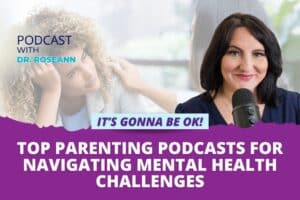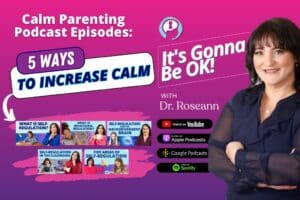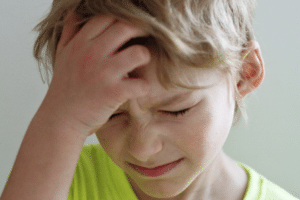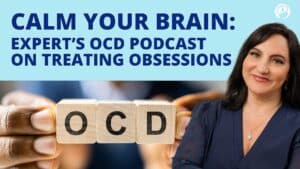If you have a child with ADHD, then you already know that kids who exhibit the symptoms of Attention Deficit Hyperactivity Disorder (ADHD) may show inattention, impulsivity, and hyperactive or impulsive behavior. Your child isn’t alone, as ADHD is a neurodevelopmental disorder that affects millions of children and teens worldwide.
It's crucial to understand what ADHD is and how it affects your child because ADHD looks different from child to child. The neurodivergent condition comes with both assets and areas of weakness
The Centers for Disease Control and Prevention (2022) reports that around 6.1 million children in the United States have been diagnosed with ADHD. It's a common condition that often continues into adulthood. ADHD can profoundly impact your child's life, particularly school work, social interactions, daily activities, and family dynamics.
Challenges Faced by Children with Diagnosed with ADHD
Children with ADHD face unique challenges that can disrupt their daily lives and the lives of their family members. They may struggle with having a short attention span, meaning it’s difficult for them to pay attention, stay focused, and follow through on tasks. Children and teens with ADHD also get easily distracted and prone to careless mistakes. As such, they often require special support through an IEP or school 504 accommodations.
However, hyperactive tendencies and impulsive behaviors aren't the only symptoms of ADHD. They can also exhibit inattention, also known as Attention Deficit Disorder. It's a combination of these ADHD symptoms that can lead to academic difficulties, learning disabilities, and even behavioral problems. However, it's important to note that, with the right support, children who show signs of ADHD can thrive.
Ways to Manage ADHD in Children as a Family
Navigating the world of ADHD in children can be challenging, but it's a journey you don't have to take alone. In this section, we'll explore eleven family-centered strategies to effectively tackle ADHD to bring hope, support, and practical solutions to the forefront.
From education and communication to structured routines and celebrating progress, these approaches will empower you to guide your child toward a brighter future. Here’s the path to helping your child thrive:
1. Invest in Family Education
To effectively tackle ADHD as a family, it's crucial to educate the entire family about the condition. The process should include understanding ADHD’s impact and learning about effective strategies for managing it. The National Institute of Mental Health (2021) and the American Academy of Pediatrics (2022) offer valuable resources for parents and teachers seeking guidance on supporting a child with ADHD.
2. Implement a Team Approach
ADHD management requires a united front. Encourage a collaborative family approach where all family members work together to support the child with ADHD. It should include not just the parents of children with ADHD, but also their siblings and extended family members who are part of the child's daily life.
3. Promote Open Communication
Open, non-judgmental communication is key. Promote a safe space within the family to discuss challenges, concerns, and successes related to ADHD. Doing so allows everyone to express themselves and share their thoughts and feelings without fear of criticism.
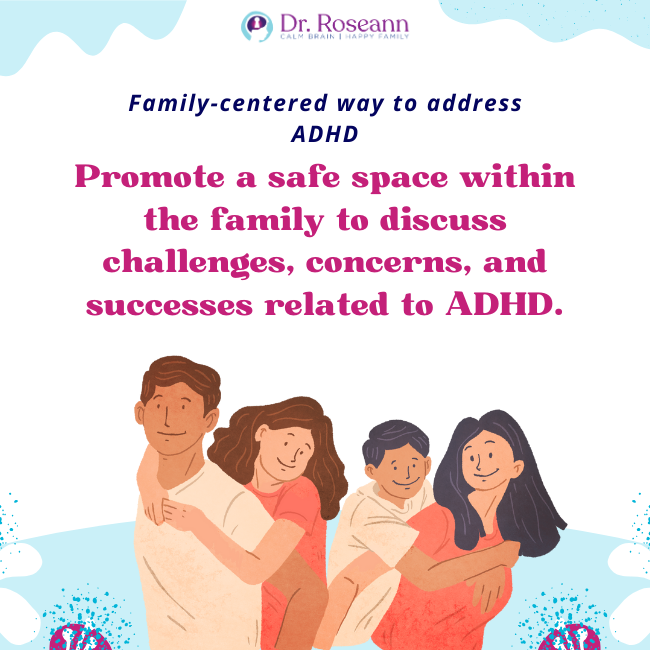
4. Create a Structured Routine
Children with ADHD thrive in structured environments. Establish a consistent daily schedule that benefits the entire family as it helps create predictability and order. A routine can make daily tasks less overwhelming and provide a sense of security for young children.
5. Set Clear Expectations
Set clear rules and expectations for all family members. Consistency in behavior and responsibilities is essential. When everyone knows what is expected of them, it reduces confusion and minimizes conflicts.
6. Use Behavioral Therapy
Implement consistent behavior management techniques that all family members can use to address ADHD-related challenges. Working with a clinical psychologist or mental health professionals with expertise in behavior therapy can provide valuable guidance and tools for effectively managing your child's symptoms and behavior problems.
7. Encourage Inclusivity
Encourage participation in activities that accommodate the child with ADHD while still involving the entire family. By finding common interests and activities that everyone can enjoy, you foster a sense of togetherness and shared experiences.
8. Show Support and Empathy
Foster a supportive and empathetic family environment. Understanding and compassion go a long way when dealing with the challenges of ADHD. Remember that your child is facing unique difficulties, and your support can make a world of difference.
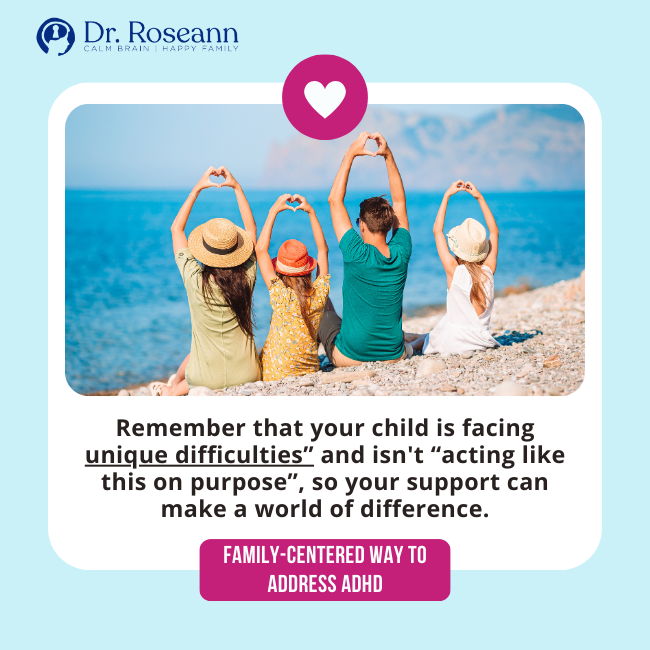
9. Practice Self-Care for All
Caring for a child with ADHD can be stressful. It's essential that each family member practices self-care and seeks support when needed. Remember, taking care of yourself is not selfish. It's a vital part of providing the best support for your child.
10. Celebrate Progress
Celebrate achievements and milestones, both big and small, as a family. Building a positive and motivating atmosphere is crucial for your child's self-esteem and well-being. The most effective approach to enhancing behavioral functioning involves a blend of positive behavior reinforcement and emotional support (Stoutjesdijk et al., 2013).
11. Connect with Other Families
Navigating the challenges of ADHD can sometimes feel like a solitary journey. However, many families are facing similar experiences and finding solace and support in connecting with others who understand the unique demands of ADHD.
Consider looking for local support groups or exploring online communities and parent advocacy groups dedicated to ADHD. These connections not only provide emotional support but also offer practical advice and a sense of community.
Managing ADHD in children requires a multi-faceted approach that involves the entire family. Understanding the condition, communicating openly, and offering unwavering support are the foundations of effective ADHD management.
The successful treatment of ADHD lies in early diagnosis. Because there isn't a single test to determine the presence of impulsive, inattentive, and hyperactive behaviors, working closely with a child psychologist to monitor your child's behavior is crucial.
The BrainBehaviorResetTM Program places the family at the core of ADHD management. It integrates the collaborative efforts of parents, siblings, and extended family members to manage symptoms of inattention, hyperactivity, and impulsivity.
Remember, the first line of treatment for younger children isn't ADHD medications but parent training in behavioral interventions. It can create a big impact on your child's social skills and daily functioning.
Families play a pivotal role in the child's journey to better mental health and behavioral stability. This innovative treatment for ADHD doesn't just treat the symptoms but reshapes the family dynamics. It fosters a nurturing home environment for the child's growth and development.
Embracing these ten family-centered strategies allows you to create a more harmonious family life for your child. These will ultimately help them thrive despite the challenges posed by ADHD, all without the use of stimulant medications and worrying about their side effects.
Parent Action Steps
☐ Educate yourself about ADHD, its impact, and available resources.
☐ Share what you've learned with your family to ensure a collective understanding.
☐ Involve all family members in supporting your child's journey consistently.
☐ Find activities that accommodate your child's needs and involve the whole family.
☐ Foster an environment of empathy and support within your family.
☐ Prioritize self-care for yourself and all family members.
☐ Practice mindfulness and relaxation techniques as a family.
☐ Take this ADHD Quiz to know if your child has ADHD or something else.
☐ Try the Solutions Matcher to get a personalized treatment plan for your child.
Citations
American Academy of Pediatrics. (2022, November 15). Supporting Students with Attention-Deficit/Hyperactivity Disorder (ADHD) in Schools. www.aap.org. https://www.aap.org/en/patient-care/school-health/mental-health-in-schools/supporting-students-with-attention-deficithyperactivity-disorder-adhd-in-schools/
Centers for Disease Control and Prevention. (2022, August 9). Data and statistics about ADHD. Centers for Disease Control and Prevention. https://www.cdc.gov/ncbddd/adhd/data.html
NIMH. (2021). NIMH» Attention-Deficit/Hyperactivity Disorder in Children and Teens: What You Need to Know. Www.nimh.nih.gov. https://www.nimh.nih.gov/health/publications/attention-deficit-hyperactivity-disorder-in-children-and-teens-what-you-need-to-know
Stoutjesdijk, R., Scholte, E. M., & Swaab, H. (2013). Behavioral and Academic Progress of Children Displaying Substantive ADHD Behaviors in Special Education. Journal of Attention Disorders, 20(1), 21–33. https://doi.org/10.1177/1087054712474687
Are you looking for SOLUTIONS for your struggling child or teen?
Dr. Roseann and her team are all about science-backed solutions, so you are in the right place!
Grab your complimentary copy of
147 Therapist-Endorsed Self-Regulation Strategies for Children: A Practical Guide for Parents
You can get her books for parents and professionals, including: It’s Gonna Be OK™: Proven Ways to Improve Your Child’s Mental Health, Teletherapy Toolkit™ and Brain Under Attack: A Resource For Parents and Caregivers of Children With PANS, PANDAS, and Autoimmune Encephalopathy.
If you are a business or organization that needs proactive guidance to support employee mental health or an organization looking for a brand representative, check out Dr. Roseann’s professional speaking page to see how we can work together.
Dr. Roseann is a Children’s Mental Health Expert and Therapist who has been featured in/on hundreds of media outlets including, CBS, NBC, FOX News, PIX11 NYC, The New York Times, The Washington Post, Business Insider, USA Today, CNET, Martha Stewart, and PARENTS. FORBES called her, “A thought leader in children’s mental health.”

She is the founder and director of The Global Institute of Children’s Mental Health and Dr. Roseann Capanna-Hodge, LLC. Dr. Roseann is a Board Certified Neurofeedback (BCN) Practitioner, a Board Member of the Northeast Region Biofeedback Society (NRBS), Certified Integrative Mental Health Professional (CIMHP) and an Amen Clinic Certified Brain Health Coach. She is also a member of The International Lyme Disease and Associated Disease Society (ILADS), The American Psychological Association (APA), Anxiety and Depression Association of America (ADAA) National Association of School Psychologists (NASP), International OCD Foundation (IOCDF) International Society for Neurofeedback and Research (ISNR) and The Association of Applied Psychophysiology and Biofeedback (AAPB).
© Roseann-Capanna-Hodge, LLC 2023



